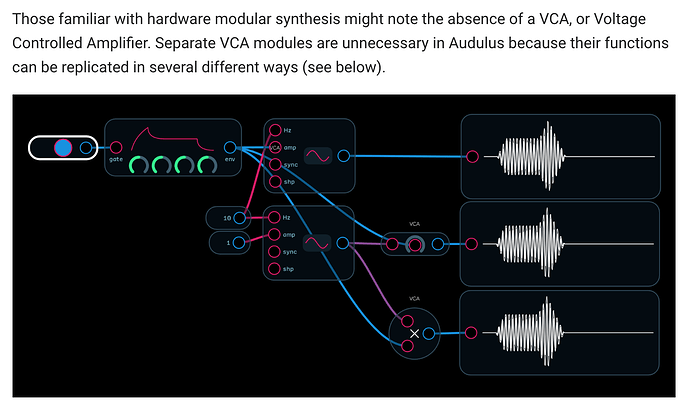For some silly reason I want to comment here. While modelling or simulating hardware components in Audulus is not the general approach to coding, the actual modules are inescapably to be treated as if they were components. There are multiple levels of confusion to be had.
As far as VCA’s go, although they are the targets for envelopes, they are not controlled by voltages. Rather, there is just a set of parameters. However, those parameters have a scope of use. We may well call them Parametric Controlled Amplifiers. But, then, they are not really amplifying anything because amplification has to do with energy, chemistry, physics, etc.
One could say that the aim is to produce discrete algorithmic tools with sweet spot ranges, that can modulate other parameters. Now, here is the best part.
It’s all logic. Hardware or code. Hardware is discrete logic components that are physically effected, and so made logically available to or by other components. The character of analog has to do with the materials that components are made of – tubes, diodes, transistors, capacitors, etc. Some of the beauty of analog happens when these parts are brought to thresholds and produce irregular behaviours which can cause a chain of interesting events, at the edge of limits or the verge of inactivity.
I have played the fool here on the form and resisted the temptations to code, because I am more interested in understanding how hardware functions than I am interested in, say, coming to understand how the various ratios integrate in a master formula. But this is more for personal reasons. I actually believe that we have not yet discovered “elementary formal logic” and believe that our logics are inadequate presently. But since we have computers and cell phones we figure we must have got it right. I don’t think so. I think Gottlob Frege was wrong (and even he admitted it in writing).
Well that’s fine but here we are…Well, it turns out that there are lost threads – whole schools of thought that are dormant because way back when, we made a right hand turn and it panned out so we never looked back. If you talk to someone who works practically with cutting edge logics you will find that the binary approach is similar to Newton. Good for somethings but not for everything. I would say the same for Einstein. I would also say that moving between the two is not the answer and neither is looking to Niels Bhor. These subjects irritate people, so I will stop there.
